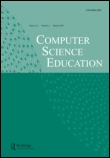
Computer Science Education
Scope & Guideline
Pioneering Research for a New Era of Computer Science Education
Introduction
Aims and Scopes
- Pedagogical Innovations:
The journal highlights new teaching methodologies and practices that enhance student learning in computer science, focusing on active learning, collaborative projects, and inclusive teaching strategies. - Curriculum Development:
It explores the design and implementation of computer science curricula at all educational levels, including K-12 and higher education, with an emphasis on computational thinking and integrated learning. - Assessment and Evaluation:
Research on effective assessment strategies for measuring computational thinking and programming skills is a core focus, including the development of new assessment tools and frameworks. - Equity and Inclusion in CS Education:
The journal addresses issues of diversity, equity, and access in computer science education, exploring ways to engage underrepresented groups and create inclusive learning environments. - Technology Integration:
It investigates the role of technology in enhancing computer science education, including the use of tools like makerspaces, online platforms, and programming environments to support learning. - Research on Student Learning Processes:
The journal examines cognitive and emotional aspects of learning computer science, including students' self-efficacy, motivation, and collaborative learning experiences.
Trending and Emerging
- Culturally Responsive Computing:
There is a growing emphasis on culturally sustaining curricula that empower diverse student populations, particularly in K-12 settings. This trend highlights the importance of context and culture in teaching computer science. - Computational Thinking Across Disciplines:
Research is increasingly focused on integrating computational thinking across various subjects, not just computer science, indicating a recognition of its importance in a broader educational context. - Online and Hybrid Learning Models:
The impact of remote and hybrid learning environments on computer science education has become a prominent theme, especially in the context of ongoing changes in educational delivery methods post-COVID-19. - Social and Emotional Aspects of Learning:
Emerging research explores the social and emotional dimensions of learning computer science, such as students' self-efficacy, motivation, and peer interactions during collaborative tasks. - Innovative Assessment Techniques:
There is an increasing focus on developing and validating innovative assessment tools that capture complex skills in programming and computational thinking, moving beyond traditional testing methods.
Declining or Waning
- Traditional Programming Languages:
There has been a noticeable decrease in publications specifically centered on traditional programming languages, as the focus shifts towards block-based and visual programming languages that are more accessible to younger learners. - Theoretical Frameworks in CS Education:
Research grounded in traditional theoretical frameworks seems to be less prevalent, with a move towards more practical, hands-on approaches that emphasize experiential learning and real-world applications. - General Computer Science Pedagogy:
Broad discussions on computer science pedagogy without specific focus areas have seen a decline, as the journal increasingly prioritizes research that targets specific populations, technologies, or pedagogical innovations. - Assessment of Basic Computer Skills:
There appears to be a waning interest in assessments of basic computer skills, as the field moves towards more complex assessments of computational thinking and problem-solving skills. - Single-Discipline Focus:
Research that solely focuses on computer science without interdisciplinary connections is becoming less common, as the journal promotes integrated approaches that combine computer science with other disciplines.
Similar Journals
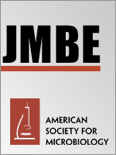
Journal of Microbiology & Biology Education
Empowering Scholars, Inspiring EducatorsJournal of Microbiology & Biology Education, published by the American Society for Microbiology, serves as a vital platform for advancing knowledge and education in microbiology and related biological fields. With an ISSN of 1935-7877 and an E-ISSN of 1935-7885, this open-access journal has been fostering scholarly communication since 2000, ensuring that vital research is accessible to a global audience. The journal covers a broad scope within the disciplines of Agricultural and Biological Sciences, Biochemistry, Genetics, Molecular Biology, and Educational methodologies, holding a significant position as reflected by its Q2 quartile rankings in multiple fields for 2023. The Scopus ranking highlights its relevance, ranking it in the 64th percentile in general Agricultural and Biological Sciences and Education, and 48th in Immunology and Microbiology. Positioned in the United States, the journal addresses the imperative need for educational resources and research dissemination in the ever-evolving landscape of microbiological sciences. Researchers, professionals, and students will find invaluable insights and pedagogical innovations within its pages, advancing both academic inquiry and educational practice.
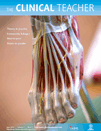
Clinical Teacher
Advancing Skills for Healthcare EducatorsThe Clinical Teacher is a leading journal published by WILEY, dedicated to fostering excellence in medical education and enhancing the skills of healthcare educators. With an ISSN of 1743-4971 and an E-ISSN of 1743-498X, this esteemed publication has gained recognition for its practical insights and innovative approaches, particularly in the realms of Teaching and Assessment within the medical field. Since its inception in 2006, it has maintained a notable impact within its categories, ranking Q3 in Medicine (miscellaneous) and an impressive Q1 in Review and Exam Preparation as of 2023. The journal's commitment to advancing educational practices is reflected in its exceptional Scopus ranking of #1 in the Nursing Review and Exam Preparation category, placing it in the 87th percentile of its peers. Although not open access, The Clinical Teacher serves as an invaluable resource for researchers, educators, and healthcare professionals focused on improving the learning experiences of future medical practitioners. With continued contributions from eminent figures in the field, this journal stands as a vital platform for the dissemination of knowledge and the evolution of teaching methodologies in clinical settings.
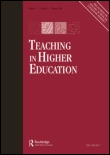
TEACHING IN HIGHER EDUCATION
Fostering inclusive discourse on educational methodologies.TEACHING IN HIGHER EDUCATION is a premier academic journal published by Routledge Journals, Taylor & Francis Ltd, dedicated to advancing the scholarship and practice of teaching within the higher education sector. With an ISSN of 1356-2517 and an E-ISSN of 1470-1294, this journal is widely recognized for its profound impact in the field, boasting a 2023 category rank of Q1 in Education, placing it in the top tier of educational research. Its commitment to fostering an inclusive and dynamic discourse on pedagogical methods and learning frameworks makes it essential reading for researchers, educators, and policymakers alike. Spanning topics such as student engagement, curriculum development, and innovative teaching strategies, TEACHING IN HIGHER EDUCATION aims to contribute to ongoing conversations and practical applications that enhance the educational landscape. While an Open Access option is not available, the journal maintains a robust readership, with its articles being rigorously peer-reviewed and disseminated to reflect cutting-edge research trends and practices in education.

Medical Science Educator
Innovating education to empower future healthcare leaders.Medical Science Educator, published by SpringerNature, is an esteemed journal committed to advancing the intersection of educational methodologies and medical science. With a significant impact in its field, this journal holds a Q2 ranking in both Education and Medicine (miscellaneous) categories as of 2023, reflecting its dedication to high-quality research and scholarly dialogue. Operating in a digital format, the journal uniquely facilitates access to pivotal studies from its inception in 2011 until 2024, fostering innovation in medical education. The latest rankings highlight its credibility, placing it at the 63rd percentile in Social Sciences - Education and the 56th percentile in Medicine - Medicine (miscellaneous) within Scopus. This platform serves as an invaluable resource for educators, researchers, and practitioners aiming to enhance teaching practices and shape the future of medical education.
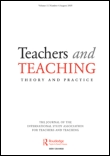
Teachers and Teaching
Elevating Pedagogy Through Innovative ResearchTeachers and Teaching is a premier scholarly journal published by Routledge Journals, Taylor & Francis Ltd, providing an essential platform for researchers, educators, and practitioners in the fields of Education and Arts and Humanities. With an editorial focus on the dynamics of teaching and learning, the journal aims to share innovative research and insightful discussions that enhance pedagogical practices and policy development. Notably, it has achieved a Q1 ranking in both the Arts and Humanities and Education categories, signifying its impact and relevance in educational research, as reflected in its Scopus rankings, with an 84th percentile for Arts and Humanities and a 76th percentile in Education. Although it does not offer open access, the journal provides extensive access options for libraries and institutions, making its rich content available to a wide audience. Spanning from 1995 to 2024, Teachers and Teaching continues to set the standard for high-quality scholarship in the evolving landscape of education, inviting contributions that explore challenges and innovations in teaching methodologies.
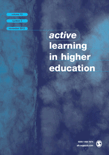
Active Learning in Higher Education
Transforming Higher Education through Active EngagementActive Learning in Higher Education is a premier journal dedicated to exploring innovative and effective pedagogical practices within the realm of higher education. Published by SAGE Publications Inc, this journal boasts an impressive Q1 ranking in the Education category for 2023, positioning it within the top percentile of academic journals in the field, with a Scopus rank of 21 out of 1543, reflecting its high impact and relevance. With coverage spanning from 2000 to 2024, the journal serves as a critical platform for researchers, educators, and students, providing insightful articles that delve into the theories, strategies, and technologies that enhance active learning experiences. While currently not open access, the enriching content is vital for anyone aiming to stay abreast of evolving methodologies and empirical studies in educational practices. Located in the United Kingdom, this journal is committed to advancing the academic discourse surrounding higher education, making it essential reading for those interested in fostering student engagement and learning outcomes.
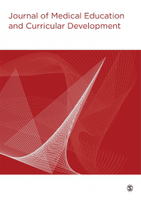
Journal of Medical Education and Curricular Development
Fostering Collaboration for Enhanced Medical EducationJournal of Medical Education and Curricular Development is a pioneering open-access journal published by SAGE Publications Ltd, dedicated to advancing the field of medical education. With an ISSN of 2382-1205, this journal has been committed to providing high-quality, peer-reviewed research since 2014. It serves as a vital platform for educators, researchers, and practitioners interested in innovative teaching methodologies, curriculum development, and assessment strategies in medical education. The journal not only aims to disseminate impactful research but also encourages scholarly dialogue on best practices and emerging trends in the field. By offering unrestricted access to published articles, it ensures that knowledge is widely accessible, promoting collaboration and improvement in medical training worldwide. As a key resource for professionals and academics alike, it supports the ongoing evolution of educational practices that directly influence healthcare outcomes.
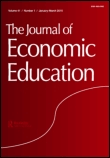
JOURNAL OF ECONOMIC EDUCATION
Elevating Economic Education with Cutting-Edge ResearchJOURNAL OF ECONOMIC EDUCATION, published by Routledge Journals, Taylor & Francis Ltd, serves as a pivotal platform for the dissemination of research in the vital intersection of economics and education. With an ISSN of 0022-0485 and an E-ISSN of 2152-4068, this esteemed journal has been contributing to the field since 1969 and continues to evolve with influential insights projected through to 2024. Ranking in the Q2 category for both Economics and Econometrics, and Education as of 2023, it demonstrates a significant commitment to enhancing educational practices in economics. Researchers and educators alike will find value in its empirical studies, theoretical explorations, and innovative pedagogical approaches. Although currently not offering open access, the journal maintains a competitive reputation with a Scopus rank placing it in the 54th and 47th percentiles across its related fields. Join the scholarly dialogue that shapes the future of economic education and informs teaching methodologies across the globe.
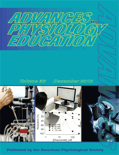
ADVANCES IN PHYSIOLOGY EDUCATION
Elevating Pedagogy in Physiology EducationADVANCES IN PHYSIOLOGY EDUCATION, published by the American Physiological Society, is a leading journal dedicated to the field of physiology education, with a commitment to advancing teaching practices and pedagogical strategies in this vital discipline. Established in 1998, the journal has consistently provided a platform for original research and discussion, fostering the improvement of educational methodologies. With an impressive impact factor and ranked in Q2 for Education and Q3 for Physiology, it reflects a robust academic influence within the research community. The journal ranks #458 out of 1543 in Social Sciences - Education and #130 out of 193 in Biochemistry, Genetics, and Molecular Biology - Physiology according to Scopus, highlighting its critical role in shaping physiology education. While it operates on a subscription model, its focus remains on promoting innovative education practices that benefit both educators and students alike. This journal is essential reading for anyone looking to enhance their understanding of physiology teaching and learning.

Research and Practice in Technology Enhanced Learning
Connecting theory and practice in educational technology.Research and Practice in Technology Enhanced Learning is a leading international journal dedicated to advancing the field of educational technology and its applications in various learning environments. Published in Taiwan, this journal has firmly established itself as an open-access platform for sharing innovative research, practical insights, and emerging trends since its inception in 2015. With an impressive Q1 ranking in Education and Media Technology for 2023, coupled with notable placements in the fields of Social Psychology and Management of Technology and Innovation, the journal underscores its significance in fostering interdisciplinary collaboration among scholars and practitioners. Its rigorous peer-review process ensures the publication of high-quality articles that contribute substantively to both theoretical and practical knowledge. The journal's commitment to open access enhances its visibility and accessibility, making it an invaluable resource for researchers, educators, and students seeking to explore the intersection of technology and learning.